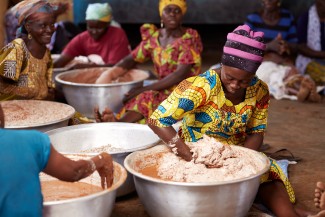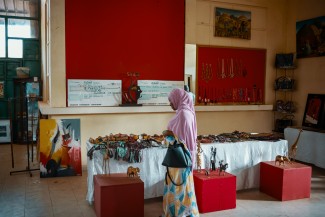Following research into the mukula value chain, recommendations to preserve livelihoods and landscapes
Every time I get interested in one particular value chain – especially those that start in the forests of sub-Saharan Africa – I wonder whether I’ll contribute to closing the barn door before or after the horses have left.
This conundrum is readily exemplified in the example of research conducted in the delicate Miombo forests of southern Africa, situated between Zambia, the Democratic Republic of the Congo (DRC) and various neighbours.
The ‘hero’ of this story is rosewood. The illegal trade in the wood is one of the world’s most lucrative businesses, and affects much of Southeast Asia and parts of Africa and South America. When demand started to increase in West Africa around 2010, exports went from basically zero to hundreds of millions of dollars in just a few years. And, rosewood’s exploitation is causing a range of environmental and socioeconomic disasters.
Even the term rosewood is tricky, as many tree species are harvested and traded under that name. In southern Africa and Zambia in particular, rosewood is best known as mukula, or Pterocarpus tinctorius.
It is an oversimplification generally attached to rosewood that one can draw a straight line from production to consumption, between a forest somewhere in Africa, Southeast Asia or South America, and on to China. The Chinese market is indeed a big consumer of rosewood because of consumer demand for dark red tropical hardwood species. Over the last decade, about US$9 billion in rosewood was imported into China, and this accounts only for wood officially listed as rosewood, which excludes many species sold as ‘rosewood’ but not recorded as such, like mukula.
Yet, in the case of mukula, the supposedly straight trading line from Zambia to China is actually more of a zigzag, with a single container from Zambia perhaps loaded onto a ship leaving from at least five African ports (including those in Kenya, Tanzania, Mozambique, South Africa and Namibia) and stopping in transit countries (including Madagascar, India, the Philippines and Vietnam), where its contents could be mixed with other tree species.
Ultimately, chances are high that mukula trees will end up on the Chinese market. But, as with many value chains, the story is much more complicated.
Trading in rosewood
Field research on the rosewood trade by a team from the Centre for International Forestry Research was conducted in four districts in southern Africa between 2016 and 2017, and included discussions with rural communities, timber harvesters, government, private sector officials, brokers, intermediaries and companies buying and eventually shipping timber out of the country. In addition, 52 focus group discussions involving a total of 494 participants were held to learn more about mukula, followed by engagement with policy makers starting in 2018 that is still ongoing.
This is what we found.
Rosewood traders in Zambia require money to buy the wood, connections to the powers that be, and contacts in downstream operations. The closer to the final buyer of the raw material outside Africa, the better.
Traders now are generally unconcerned as to how the wood was obtained. But, when they initially entered the business, competition was high, and people had to roam villages in rural areas, possibly with the help of local chiefs, translators, facilitators and brokers. As rosewood traders make a name for themselves, they tend to move to the capital, leaving behind a network of preferred brokers who source the wood.
Contacts downstream are also essential, especially as Zambia is a few thousand kilometres away from wherever the timber is going. Traders may at times ‘procure and sell’ on the spot, but that is not where the money is made. Buyers and networks built over years and across oceans are required.
Eventually, containers filled with rosewood reach their destination, and trees purchased in Zambia for approximately US$20 dollars per cubic meter earn a trader about US$1,000 dollars per cubic meter.
Farmers turned loggers
During this research, we came up with the term ‘farmers turned loggers’ because almost anywhere that the rosewood trade has been documented, farmers are lured into logging. They accept an average income of US$4 per tree cut, which translates into what for them is a substantial – albeit very short-term – income of about US$770 a year. ‘Farmers turned loggers’ can roam for months in surrounding forests in search of mukula trees. Or anything else with dark red colour for that matter.
Meanwhile, elders, wives, friends and children cover their work on the family farm, waiting for the much-needed income to provide for their basic needs like health and education.
Start date in logging reported by interviewed cutters (bars = total per year, line = cumulative percentage)
There are two immediate problems with this model. First, the ‘farmer turned logger’ discovers very soon that, after one or two logging seasons, the resource is simply gone from the surrounding environment. So, unless he turns into a professional logger – something that happens very rarely – once back home he’ll go back to his previous occupation.
Second, the landscape as it was before the rosewood frenzy is now very much depleted, and there is a risk he is unable to provide the same vital services as before for his family and community’s survival.
It is difficult to fully quantify the services that millions of now gone mukula trees were providing in Zambia, or the DRC, or Malawi, or the world. We estimate that during the mukula frenzy, between 90,000 and 150,000 hectares of forest was affected annually by unregulated and unsustainable logging operations, with revenue losses of about US$3 million. Such depletion has impacted flagship fauna species living in those dry forests, and increased natural phenomena such as fire to which these forests are very prone.
Positive signs
On 21 August 2019, the proposal championed by Malawi to list mukula under Appendix II of the Convention on International Trade in Endangered Species (CITES) of Wild Fauna and Flora was accepted during the CITES CoP18. Appendix II includes species not necessarily threatened with extinction, but in which trade must be controlled to ensure their survival.
This is a step in the right direction, but it is not enough. Unfortunately, traders are able to continue their work even under the stricter circumstances instituted by many countries. In Zambia, for example, as in several other countries, the government has adopted a long series of log production and trade bans, but there needs to be better enforcement.
Enforcement tools with larger scope are essential, for business as usual is consuming forests. In Zambia and the DRC, traders are looking for mukula, but also for any tree that consumers could buy as ‘rosewood’. This tells us that enforcing rules on single species – such as the CITES resolution does – is okay. But this works only in conjunction with bolder approaches to national and regional laws and policies.
Broader networks are the only long-term solution. For years, people have been talking about certain countries’ efforts to fight illegal logging, almost always with the corollary sentence about other countries that are not. China has just passed a new forest regulation that, for the first time, explicitly talks about illegal logging and trade – and condemns it. Let’s take such positive moves and build on them for more impact on the ground, where resources are being depleted.
Continued pressure is the final requirement. In such an interconnected world, along complex and murky value chains, continued pressure on countries and regions to improve and apply their own laws, and on businesses to play by the rules, must not falter.
We all have a role to play, and we need to be well aware of it. As citizens of this planet, let us not be framed into the ‘producers and consumers’ binary. At each node of the value chain, we can find a way to push the right button. In this business, there are plenty of doors and windows in the barn, and only if we come together can we shut them all before the horses are gone.
------------------------
Paolo Omar Cerutti is a Forester at the Centre for International Forestry Research (CIFOR).
Header image - ©Jim O'Neill/EIF
If you would like to reuse any material published here, please let us know by sending an email to EIF Communications: eifcommunications@wto.org.





